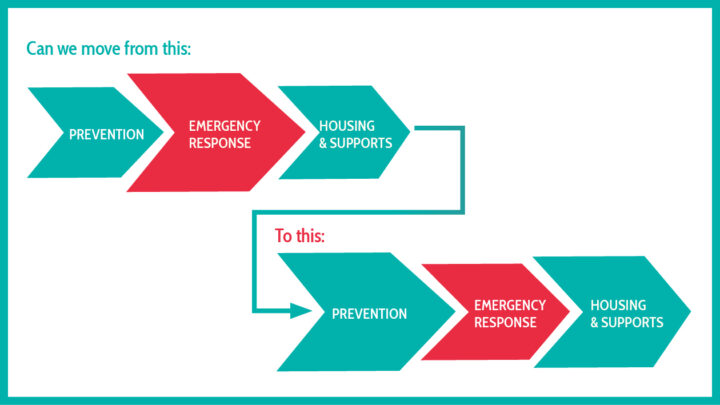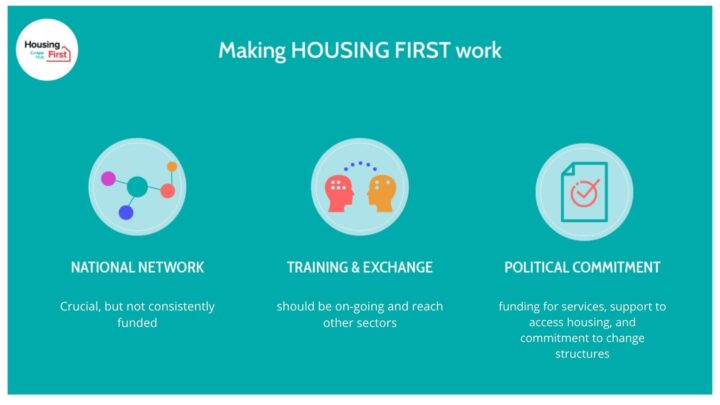WHAT IS HOUSING FIRST

In many traditional homeless services, people are first expected to demonstrate that they are ‘housing ready’ – meaning that they have to prove they are able to live independently or with only low levels of support – before they can access stable housing.
In Housing First, housing is the starting point rather than an end goal, supported by policies and practices that are designed to keep people in existing ordinary housing if they are experiencing or at risk of homelessness. As the name suggests, a Housing First service provides housing as soon as possible, without attaching conditions such as a requirement to abstain from drugs and alcohol. This means that people in Housing First programmes have a high degree of control over the support and treatment they receive, including whether or not to use different support services.
Housing First is a key solution to help end homelessness. Some countries and cities have well-established Housing First programmes that are integrated into their social strategy, others are just getting started. On our webpage you can find resources to help introduce and/or scale up Housing First in your community.
For a quick overview of Housing First, please refer to our one-pager here!
System Change Approach

A systems change approach is essential for Housing First because homelessness is not just an individual issue but a result of broader structural failures. Housing First works best when policies, funding, and services are aligned to provide long-term housing and support. Instead of treating homelessness as a temporary crisis, systems change focuses on prevention, integration of services, and long-term solutions.
This means shifting from fragmented, short-term interventions to a coordinated response where housing, healthcare, and social support work together. It requires policy reforms, sustainable funding, and cross-sector collaboration to ensure Housing First is not just a project but a core part of national and local homelessness strategies. By embedding Housing First into mainstream housing and social policies, governments can create lasting solutions that move beyond managing homelessness to effectively ending it.
The Core Principles of Housing First

Housing is a human right
The UN Committee on Economic, Social and Cultural Rights established a right to housing that says that a person should be able to live in security, peace and dignity.

Choice and control for service users
People using Housing First services should be listened to and their opinions should be respected, so they can exercise real choices about how they live their lives and the kinds of support that they receive.

Separation of housing and treatment
Housing First ensures the human right to housing is not compromised by requiring service users to engage with treatment either to access housing, or to remain in housing.

Recovery orientation
Focusing on the overall well-being of an individual, including physical and mental health, level of social support (from a partner, family or friends) and level of social integration, i.e. being part of a community and taking an active part in society.

Harm reduction
Working with users to encourage them to reduce and manage their drug and alcohol use. The aim is to minimise the harm that someone experiences, and while this can lead to abstinence, abstinence is not a requirement to receive support.

Active engagement without coercion
Actively engaging with Housing First service users in a positive way that makes them believe that recovery is possible and encourages them to engage with the help they need and access the resources available to them.

Person-centred planning
While some homelessness services expect users to follow a set path, with a fixed sequence of services that work in the same way with everyone, Housing First is designed to encourage and enable people to build their own path to recovery, using whichever mix of services suits their individual needs and preferences.

Flexible support as long it is required
Housing First support follows the individual, rather than being attached to a place or property. This allows Housing First to maintain contact if someone loses their existing housing, or has, for example, to enter hospital or prison on a short-term basis.
Housing First – an introduction

An introduction to Housing First
Watch the video below to hear from Housing First experts: the coordinator and a colleague from FEANTSA (one of the Hub’s funding partners), Nicolas Pleace (author of the HF Europe Guide), and Sam Tsemberis (the founder of Housing First). They share their insights on what Housing First is, the evidence behind it, and where you can learn more about the key ingredients that make it work.

An Introduction to Housing First
This video introduces the basics of Housing First, including its 8 Core Principles, and offers essential insights for beginners, new practitioners, and others interested in the approach. It explains what Housing First is, why it matters, and who it prioritises, explores the shift from the Staircase Model, and reflects on why the model works, who can take part, and the evidence behind its success.

Housing First in Europe Guide
The Guide is a resource about Housing First in Europe. It has been designed to explain what Housing First is and how it actually works in a range of European contexts. It sets out the core principles of Housing First and shows how these are implemented in different settings. The Guide is the first European resource of its kind. Find out more HERE.
Publications
Housing First Guide – Europe
The Housing First Guide – Europe is a cornerstone text for all policymakers, researchers, practitioners, trainers, and anyone else who wishes to understand Housing First and how to implement…
Find out more hereAn Introduction to Housing First
Designed for people who are learning about Housing First for the first time, this short digital guide offers an overview of the core principles and features of Housing First,…
Find out more hereHousing First in Europe: An Overview of Implementa…
This overview of the development of Housing First in 19 countries in Europe was designed to take a snapshot of how quickly Housing First is being adopted, the extent…
Find out more hereA New Systems Change Perspective – Demos Helsinki…
This report by Demos Helsinki examines how Housing First holds great potential to enable systems change in homelessness. Grounding the analysis in systems thinking, the work has engaged decision-makers,…
Find out more hereAchieving a new systems perspective to ending home…
Achieving a new systems perspective to ending homelessness through Housing First: A policy and practice guide Housing First programmes are one of the most researched social policy interventions of…
Find out more hereFrequently Asked Questions
-
Housing First is specifically tailored for individuals who require substantial assistance to transition out of homelessness. This approach is particularly beneficial for various groups, including those who are homeless and grappling with severe mental illnesses or mental health issues, individuals experiencing homelessness with problematic substance abuse, and those facing physical health challenges, disabilities, or chronic illnesses. Additionally, Housing First has demonstrated its effectiveness in supporting individuals experiencing long-term or recurring homelessness, who often lack social support networks and community connections.
More information can be found in the Housing First Europe Guide here (available in different languages).
-
Housing First services have demonstrated remarkable success in resolving homelessness for individuals with significant support needs. In the majority of cases, European Housing First services have achieved a homelessness resolution rate of at least 80% for those in the programme.
Data supporting this high housing retention rate can be found in the Housing First Guide here and the ‘Housing First in Europe – An Overview of Implementation, Strategy and Fidelity’ report here.
-
Support providers adhere to the principles of active engagement and respectful persistence, ensuring that cases remain open even when engagement levels are low. If a client becomes completely self-sufficient and needs support, then they would graduate from the HF programme.
Local partners usually actively collaborate to determine the specific support needs and preferences of each individual, allowing them to define what support means to them and how they are willing to receive it. In practice, most tenants engage with support in a personalised manner, benefiting from the removal of conditionality and emphasis on choice and control.
This approach enables individuals to identify and access the support that holds the most value for them as they settle into their new home. There is no predetermined support plan or mandatory number of support hours to fulfil.
-
This can vary from country to country or even in between cities within the same country. The most promising approach is usually a multi-level approach including both top-down and bottom-up strategies.
If you are interested in how things work in your country, you can visit the country page on our home page and see the stakeholders and strategies involved.
If you are interested in how we can support municipalities who are newcomers to Housing First, please contact Laura Fritz at laura.fritz@housingfirsteurope.eu
-
The homelessness sector involves multiple stakeholders with diverse approaches, resources, and interests, resulting in potential resistance from various actors such as local authorities, municipalities, and government entities. To effectively address this resistance, advocacy work and strategic lobbying can be undertaken at the appropriate levels, including local, regional, and national levels.
The Housing First Europe Hub has a working group dedicated to Advocacy and Policy Development which is a place to exchange ideas and good practice about advocacy on regional, national and EU level. It is also a place to plan initiatives which can be collectively launched to support the Housing First Europe Hub members’ work.
To learn more, please visit the Knowledge and Advocacy Network page, and the System change and Advocacy page.
-
Homelessness is caused by many interconnected factors, spanning from insufficient availability of affordable housing and poverty to mental health challenges and addiction. The implementation of Housing First can be instrumental in facilitating this transformation, but only if it is integrated into a systems change approach.
The principles that guide Housing First should hence not only be applied to individual programmes, but should also be used to transform the broader approach towards resolving homelessness.
For more information about how Housing First has the potential to enable a systems change in homelessness, you can read the Demos Helsinki Report on ‘A new systems perspective to ending homelessness’ here.
The city of Liverpool conducted a feasibility study on the implementation of Housing First on a wider scale in 2021. You can read the full report here.
This study demonstrated as well that a change in systems and culture is needed for a successful implementation but it also showed that collaborations and a network of various partners and stakeholders is needed. Networks on every level are the key to implementing Housing First
The building of a network and at the same time ensuring Housing First fidelity on a national and international level can be ensured through training programmes for Housing First workers and managers.
The Housing First Europe Hub offers a Train the Trainer programme to ensure that trainers from different countries speaking different languages get the right tools to then offer Housing First training in their home countries. More information can be found here.

-
A positive development on EU level towards tackling homelessness took place within the recent years. The European Parliament, other European institutions, EU governments and civil society are shifting towards housing-led approaches as well as a focus from managing to ending homelessness. In both cases Housing First is the right approach to achieve these goals.
Evidence of this can be found in the European Parliament resolution of 24 November 2020 on tackling homelessness rates in the EU as well as the European Parliament resolution of 21 January 2021 on access to decent and affordable housing for all. This resolution calls on the member states to adopt the principles of Housing First.
Currently the European Commission in the European Pillar of Social Rights Action Plan encourages stakeholders to implement HF as we can see in the EPOCH (European Platform on Combating Homelessness) work programme.
However, it has to be mentioned that the EU doesn’t have jurisdiction over local housing markets. On a national level, some of the EU grant calls include a focus on homelessness and sometimes Housing First.
-
The main challenges to the practical implementation of Housing First are
- Achieving mind-shift on different levels
- Limited affordable housing
- Securing funding
- Lack of integration into national homelessness strategies
- Shifting from the shelter model
- Staff recruitment and retention
- Fidelity and monitoring
The challenges for the countries in the EU can vary a lot depending on the social economic conditions, political will and cultural sensitivity.
-
The question about how to source and secure Housing for Housing First projects is probably one of the most commonly asked questions from Housing First service providers. Especially in the current global situation with the rising cost of living crisis, being in a post pandemic time and the energy crisis it proves to be more and more difficult to access sufficient housing to meet the current need.
Therefore, it is important to start the conversation about how we can source and secure more housing for Housing First and housing-led solutions to homelessness. The Housing First Europe Hub and the Housing Solutions Platform teamed up to look into ways to solve the housing shortage by showcasing examples from across Europe that include established projects but also untapped ways to unlock housing with great potential. You can read the full report here.
-
Some Housing First programmes are not allowed to deliver services to migrants without papers. As long as programmes are able to help, no distinction is made.
In some places the funding is limited to people with the right documents.
Housing First in France works as a best practice example because a majority of people who are homeless in France are migrants. The Housing First teams can help with access to documents. Similar to adapting Housing First specifically for young people or women, when working with migrants Housing First, while still staying true to the core principles, needs to be adapted to the specific needs of migrants as well and offer different levels of help.
In addition, different partnerships / actors would be needed. For working with migrants it could for example be useful to work closely with migrant organisations.